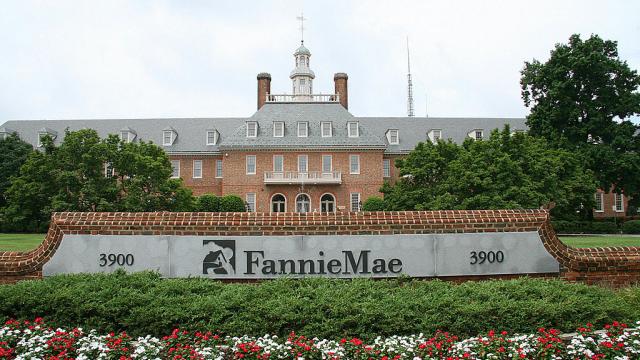Friday, December 08, 2017 9:44:58 AM
BY GLEN CORSO, — 12/07/17 03:20 PM EST

Federal guarantee of MBS is a twofer for big banks
A proposal to provide a federal guarantee only on mortgage-backed securities (MBS) issued through Fannie Mae and Freddie Mac (or their successors) as part of mortgage market reform will leave small lenders and their customers out in the cold and hand the mortgage market back to the big bank lenders.
A federal guarantee only on MBS further tilts the competitive field in the mortgage market to the big bank lenders in two ways. First, borrowing costs for Fannie/Freddie, known formally as government sponsored enterprises (GSEs), will increase and that increase will be disproportionately borne by small lenders selling their loans to the GSEs.
Second, a federal guarantee on MBS means that they become assets that carry a zero capital charge for the big banks, which means they can purchase and hold those MBS at highly favorable prices, a competitive advantage that is beyond the reach of small lenders.
As the House Financial Services Committee continues its preparatory work for a full-blown consideration of GSE reform in 2018, it appears that there is a gathering consensus that a federal guarantee will be necessary for the housing finance system to operate.
Currently, the preferred stock purchase agreements between the U.S. Treasury and Fannie and Freddie are an implicit federal guarantee for each organization. That implicit guarantee favorably affects both the borrowing costs for the GSEs and the MBS they issue, resulting in lower costs for consumers, both those whose mortgages are sold to the GSEs through the cash window and those whose mortgages are financed through direct placement in MBS.
Small and mid-size lenders who typically sell to the GSEs through the cash window thus are able to remain competitive with larger lenders who place their mortgages directly in MBS that they issue through the GSEs.
The consumers served by smaller lenders get the benefit of those competitive rates.
If the federal guarantee only extends to the MBS issued by the GSEs, then small lenders and their customers would lose their direct access to those competitive rates as borrowing costs for the GSEs would increase, including the borrowing costs associated with financing mortgages purchased through their cash windows.
The prices offered to small lenders selling to the cash window would decline to offset those increased costs.
Now you might think that small and mid-size lenders could side-step this competitive disadvantage by accumulating mortgages in order to place them directly in federally guaranteed MBS that they would issue through the GSEs.
But that ignores the twofer that favors the big banks in the MBS federal guaranty proposal. The big banks will have an advantage, thanks to their capital rules, over midsize and small lenders. An advantage that some analysts have pegged at $200 billion+.
They will be able to use that advantage to regain the dominant position they enjoyed in the pre-2011 days when the GSEs extended discounted guarantee fees only to big lenders, forcing midsize and small lenders to sell their loans to the big guys.
The advantage the big banks will have is that they can own securities issued or guaranteed by their national government without holding any capital against those securities, nor would they have minimum liquidity requirements for those investments.
They would be able to extend that advantage to the primary market as well, where their mortgage subsidiaries operate.
The big banks could decide how much of their advantage they want to share with borrowers in the primary market by offering discounted interest rates.
Those rates could not be matched by midsize and small lenders either through sales to the cash window or by issuing their own MBS, since small and midsize lenders lack the ability to purchase and hold their own MBS with zero capital costs and no liquidity requirements.
So presto chango, we are back to the pre-2011 days when the only way midsize and small lenders can serve the home financing needs of their customers is to go hat-in-hand to the big bank lenders and sell them their mortgages and the servicing rights to those mortgages at a price set by the big banks.
For these reasons, the proposal to place a federal guarantee only on MBS as part of mortgage market reform is a bad idea. It puts a big, fat thumb on the scale in favor of the big bank lenders and leads to fewer choices for consumers. It should be rejected by Congress.
Glen Corso is the executive director of the Community Mortgage Lenders of America, which is a trade association that represents lenders who originate mortgage loans, sell mortgage loans to permanent investors and who service those loans.
FEATURED POET Announces Design Win and Collaboration with Foxconn Interconnect Technology for High-speed AI Systems • May 14, 2024 10:09 AM
FEATURED Element79 Gold Corp Reports Exceptionally High-Grade Results from Lucero • May 14, 2024 7:00 AM
VAYK Added New Manager for Expansion into $64 Billion Domestic Short-term Rental Market • VAYK • May 14, 2024 9:00 AM
Avant Technologies Equipping AI-Managed Data Center with High Performance Computing Systems • AVAI • May 10, 2024 8:00 AM
VAYK Discloses Strategic Conversation on Potential Acquisition of $4 Million Home Service Business • VAYK • May 9, 2024 9:00 AM
Bantec's Howco Awarded $4.19 Million Dollar U.S. Department of Defense Contract • BANT • May 8, 2024 10:00 AM










